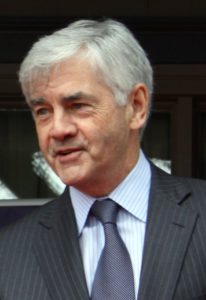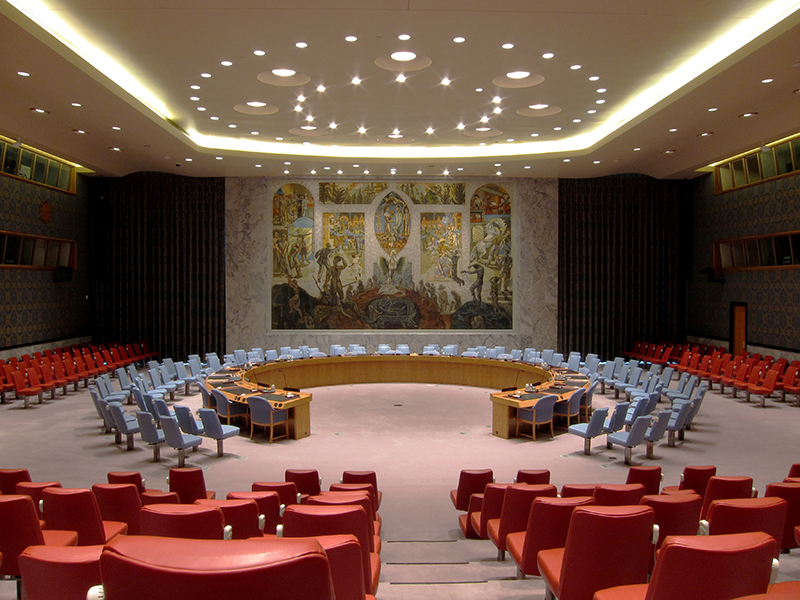In 2010, many believed that prime minister Stephen Harper’s Conservative government failed to win a seat on the United Nations Security Council, at least partly because of its fervent support for Israel.
Also blamed for Canada’s loss of the seat to Germany and Portugal was Harper’s stance on climate change, as well as what was seen as Ottawa’s disengagement from Africa, particularly its lack of aid.
It was Canada’s first failure to secure a seat on the 15-member Security Council, after being elected once a decade since the UN’s founding.
At the time, foreign minister Lawrence Cannon acknowledged that foreign policy may have played a role in the unsuccessful bid. But the Tories were unapologetic.
“We will not back down from our principles that form the basis of our great country, and we will continue to pursue them on the international stage,” Cannon said. “Some would even say that, because of our attachment to those values, we lost a seat on the council. If that’s the case, then so be it.”

Now, the Trudeau Liberals are working toward winning a seat on the Security Council in 2021. Will Israel again be an issue?
Much depends on whether the Liberals will still be in power in five years. But to date, Trudeau’s “staunch support for Israel at the UN – a holdover from the Harper years – has left Canada significantly offside with world opinion, including major Canadian allies (and influential UN players) Britain, France and Germany,” wrote Linda McQuaig in the Toronto Star last February.
Indeed, the Liberals have not changed how Canada votes on Israel-related matters at the UN.
Trudeau announced Canada’s intention to vie for the coveted seat during a March 2016 visit to UN headquarters in New York.
The Liberals are serious about it: six people in Ottawa are working on the bid, with two more at Canada’s permanent mission to the UN in New York, according to the foreign ministry.
“Canada’s strongly pro-Israel position on the Israel-Palestine issue puts it at odds with all the other members of the Security Council, except the U.S.A., and the great majority of members of the General Assembly,” Paul Heinbecker, former Canadian ambassador to the UN, told the Star in February. “This will not help our bid for a seat.”
He sounded much the same in a brief interview with The CJN.
“If you go into the next election with exactly the same posture and record as the previous (government), you can probably expect the same result,” he said.
Much depends on whether there will be another flare up of tensions in the Middle East and how Canada responds, noted Prof. Harold Waller of McGill University in Montreal.
READ: CANADA URGED TO STAY TRUE TO IDEALS IN SEEKING UN SECURITY COUNCIL SEAT
“If the government came out with a strong pro-Israel stance, this might affect the outcome of the (UN vote). If things are quiet and the government keeps a low profile on Israel, then it probably won’t be an important factor.”
Waller doesn’t think the Trudeau Liberals will become hostile to Israel, “but there are degrees of enthusiasm, of support that can be expressed. So long as there’s no great crisis in the Middle East, this will not affect Canada’s bid for a seat.
“If, however, there’s another war between Israel and Hamas in Gaza, and if the government were then forced to take a stand, that could affect the outcome.”
Waller agreed that Trudeau has not altered the Conservatives’ Israel-related votes at the UN, but the Liberals’ tone on Israel is different.
“The Trudeau government has de-emphasized its support for Israel, in terms of pronouncements,” Waller said.
The Centre for Israel and Jewish Affairs (CIJA) believes bringing Israel into the mix is naive.
“Securing a seat at the UN Security Council is a complex process that involves many factors. Suggesting that support for Israel was the primary impediment preventing Canada from securing a seat reflects a flawed understanding of how things work at the UN,” noted CIJA CEO Shimon Koffler Fogel.
“Those who allege that Canada was unable to secure a seat solely, or even primarily, because it voted in support of Israel in the (General Assembly) are either trying to advance an anti-Israel agenda, or do not understand how the UN operates,” Fogel stated.










